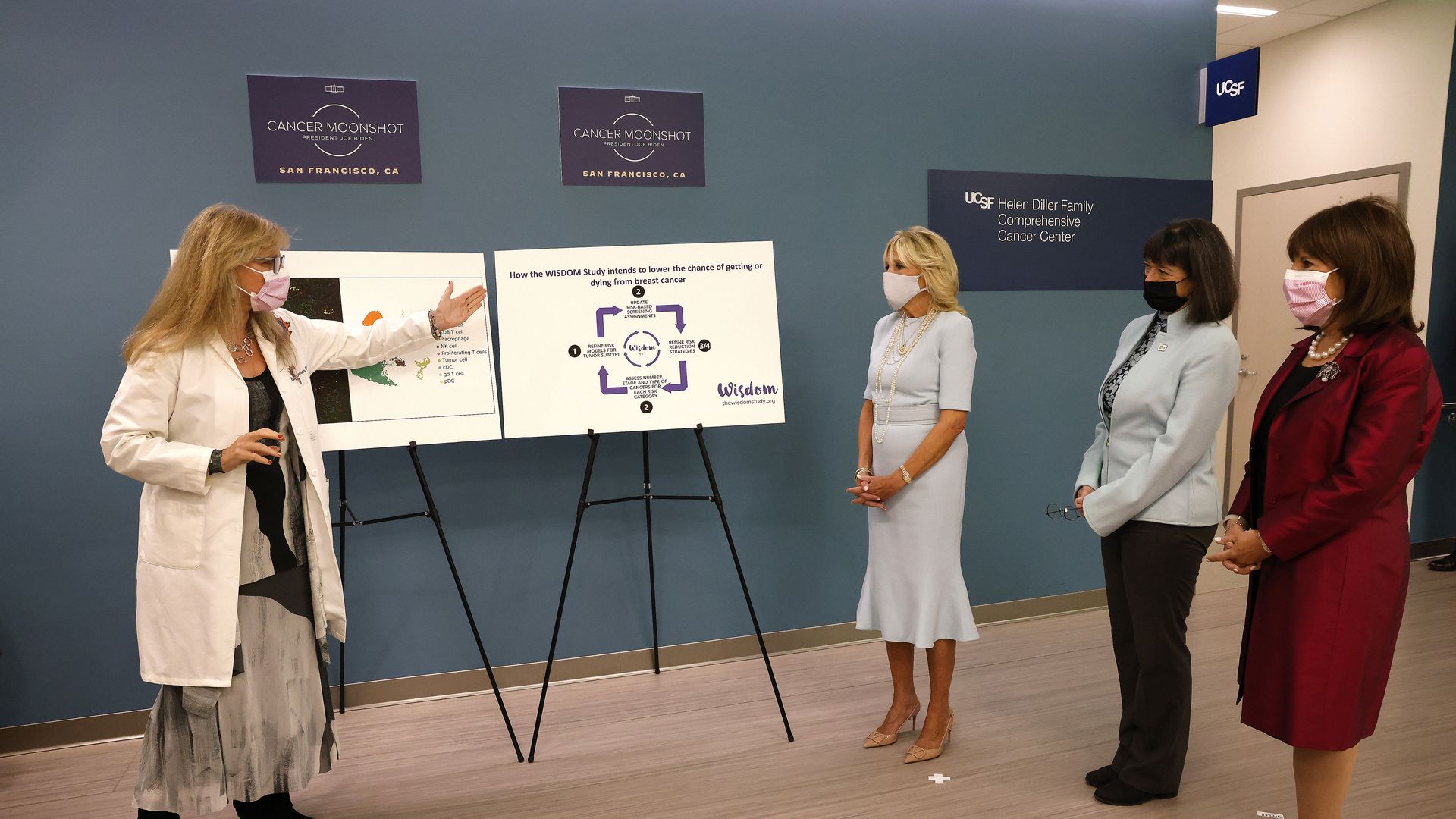| |
| |
| |
| Presented By PhRMA |
| |
| Axios Vitals |
| By Tina Reed · Apr 03, 2023 |
| Happy April, Vitals readers. Today's newsletter is 958 words or a 3½-minute read. 🍻 On tap this week: Expect plenty of email bounce backs with the holidays, spring break and the congressional recess nigh. The World Vaccine Congress also kicks off today in Washington, D.C. |
| |
| |
| 1 big thing: Medicare Advantage's complicated tradeoffs |
 |
|
| Illustration: Gabriella Turrisi/Axios |
| |
| The Biden administration continues to grapple with an awkward tension when it comes to Medicare Advantage: MA plans typically offer more generous benefits than traditional Medicare does, and they also cost taxpayers more money, Axios' Caitlin Owens and Maya Goldman write. - That's despite the fact that privately administered Medicare was created to save the government money.
Why it matters: A fiscal 2024 Medicare Advantage rule released on Friday aims to crack down on what experts say are inappropriate — and at times potentially fraudulent — insurer billing practices, and could force plans to decide between cutting benefits and lowering their own profits. Driving the news: The Centers for Medicare and Medicaid Services announced it's phasing in payment changes for privatized Medicare plans over the next three years — and estimated that insurers will see an average 3.32% payment increase, or $13.8 billion, next year. The big picture: The program has become some insurers' most lucrative line of business, growing to now serve nearly half of the eligible population, per KFF. Insurers report higher gross margins per enrollee in MA markets than in other coverage lines. - The Biden administration's initial version of the rule, released in February, prompted significant pushback from insurers, who warned that the proposal would have a harmful impact on beneficiaries.
- The final version is more generous to plans, but insurers still say they're concerned about unintended consequences for seniors.
- Many experts still think the original version didn't go far enough in reining in insurers' costly billing practices, and worry the finalized policy amounts to a win for an industry that's gaming the system.
- Under the extended phase-in of the new payment structure, plans have more time "to exploit the flawed system," Mark Miller, executive vice president at Arnold Ventures. "Congress and the administration need to come together and address abuses in the Medicare program."
Go deeper. |
    |
| |
| |
| 2. First in Vitals: A new "National Cancer Plan" |
 |
|
| First lady Jill Biden, National Cancer Institute director Monica Bertagnolli, and Rep. Jackie Speier listen to Laura Esserman speak at the Helen Diller Comprehensive Cancer Center on Oct. 7, 2022. Photo: John G. Mabanglo-Pool/Getty Images |
| |
| Federal health officials are rolling out a new "National Cancer Plan" today as a framework for pursuing President Biden's Cancer Moonshot goals — including cutting the cancer death rate in half within 25 years, HHS officials told Axios first. Why it matters: It offers a glimpse at how the National Cancer Institute will pursue those and other goals under new director Monica Bertagnolli, who took over six months ago. Details: The plan was developed with input from inside and outside of government and outlines eight goals, including early detection, developing effective treatments and eliminating inequities. - It calls on researchers to take actions such as pursuing new vaccines that prevent cancers, developing new screening and ways to identify and address precancerous cells and to increase participation in clinical trials.
The big picture: President Biden and First Lady Jill Biden relaunched the Moonshot — first started when Biden was vice president — in 2022. The administration has since announced investments in other areas of cancer screening and research as part of the Moonshot. Yes, but: This plan doesn't come with new authorities or funding for cancer research. - Officials say it aims to promote collaborations and sustain communication around the goals.
|
    |
| |
| |
| 3. Crackdown on hospice fraud |
 |
|
| Illustration: Annelise Capossela/Axios |
| |
| Medicare administrators are cracking down on hospice fraud, releasing a proposal to require physicians who order hospice services to be enrolled in or validly opted out of Medicare in order to get paid, Maya writes. Why it matters: Lawmakers are concerned about hospice fraud and want to see CMS step up to curb it. - Reps. Beth Van Duyne (R-Texas) and Earl Blumenauer (D-Ore.) wrote to CMS in February asking for a briefing on the agency's oversight of the hospice program and any gaps in oversight tools.
- "CMS is looking closely at the hospice industry, as we have increasing concerns about fraud, waste and abuse in this space," the agency said in a fact sheet accompanying the proposal.
The proposal could strengthen the integrity of physician certifications for Medicare beneficiaries going into hospice services, CMS said in the rule. - CMS cites reports from the Office of Inspector General that some physicians have falsely certified beneficiaries as terminally ill in order to get them into hospice care.
- ProPublica and the New Yorker late last year documented how the design of Medicare's hospice benefit and lax payment systems create incentives for hospices to cut corners and target patients who are not actually dying.
A version of this story was published first on Axios Pro. Get news like this by subscribing. Use code POLICY100 which gives you $100 off. |
    |
| |
| |
| A message from PhRMA |
| Did you know that just 3 PBMs control 80% of all prescriptions? |
| |
 |
| |
| And all three own or are owned by insurance companies. They often own your pharmacy too. This extreme market consolidation steers you toward pharmacies that make them more money — regardless of what's best or convenient for you. Haven't heard about this? That's by design. |
| |
| |
| 4. Data du jour: Life science real estate soars |
 Data: CBRE Research, Q4 2022; Chart: Danielle Alberti/Axios The inventory of U.S. life sciences laboratories and R&D sites jumped by nearly 50% in five years to 181.7 million square feet as of the fourth quarter of 2022, according to a CBRE report provided first to Axios. - CBRE forecasts the properties will consume 220 million square feet by 2025 as new construction is completed, with nearly a third of the future space already pre-leased, according to the 2023 U.S. Life Sciences Outlook.
Why it matters: While there's been plenty of pessimism hanging over commercial real estate since the Silicon Valley Bank failure — something that's certainly impacted the life sciences — the report points out multiple reasons to expect the sector will endure. - Though bank turmoil is likely to slow venture capital funding, initial public offerings, and job growth, there's still a bevy of clinical trials for new drugs, federal funding, and ample cash reserves — at least for biotech's bigger players.
- The industry's vacancy rate, which rose to 5.7% in the fourth quarter from 5.1% in the third quarter of 2022, is still low compared to many other sectors.
|
    |
| |
| |
| 5. While you were weekending |
 |
|
| Illustration: Aïda Amer/Axios |
| |
| 💰 Social Security trust fund on track to run out in 2033. (The Hill) 🎯 House GOP's next COVID target. (Axios) 👋 CVS Health Care Delivery president Amar Desai returns to UnitedHealth Group. (Bloomberg) 🗣 Sen. John Fetterman discusses his depression and recovery. (CBS News) |
    |
| |
| |
| A message from PhRMA |
| The 3 largest PBMs denied coverage to over 1,150 medicines last year |
| |
 |
| |
| And all three own or are owned by insurance companies. They often own your pharmacy too. That includes medicines that could lower your costs at the pharmacy. Pharmacy benefit managers (PBMs) are putting their profits before you. Haven't heard about this? That's by design. |
| |
| Thanks for reading, and thanks to senior health care editor Adriel Bettelheim and senior copy editor Bryan McBournie for the edits. |
 | | Dive deeper into the future of health care | | |
No comments